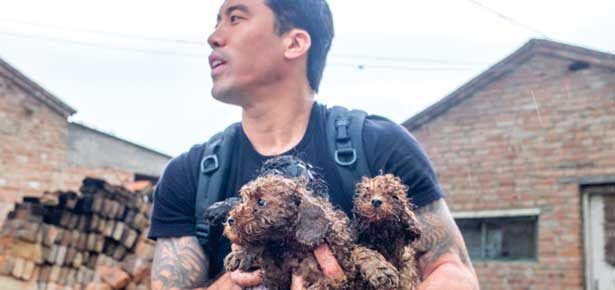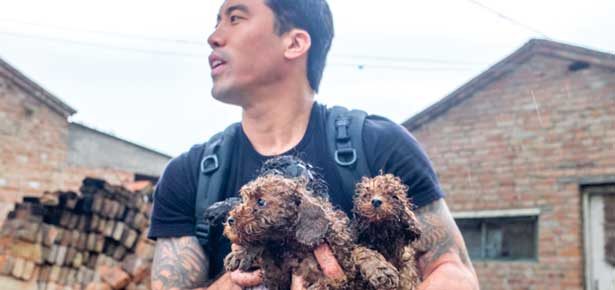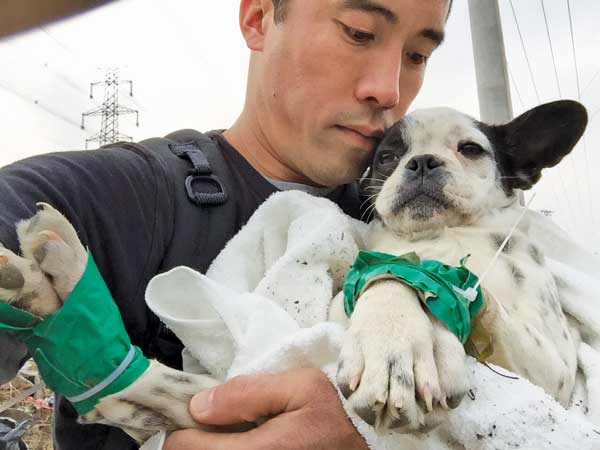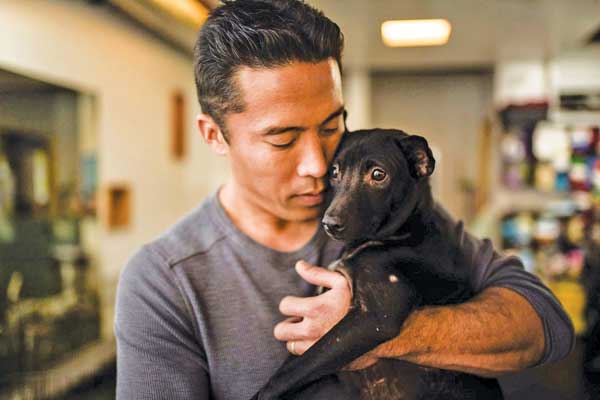

Animal Champion
Marc Ching is what many would call the ultimate champion of animals.
Marc Ching is what many would call the ultimate champion of animals, rescuing dogs and cats from terrible conditions and disastrous situations and circumstances around the world. But, no matter how disturbing his eye-witness stories may be, he implores us not to look away, because, he says, that is the only way we will bring about change.
Marc Ching’s story begins in beautiful, natural Hawaii, where he was born and raised. His immense love and respect for animals began there, too. Growing up, his family owned and nurtured many pets. In college, Marc had hamsters, ferrets, cats, and dogs—he even had a chicken living with him in his house. After graduating, he began working in the health and medical field as a nutritionist and Japanese herbalist—and that’s where his love of critters evolved into a full-fledged career.
“People started bringing these abused animals to me in Los Angeles,” he says, adding that he launched his PetStaurant business, making high-quality, holistic, healthy food for dogs, in that city in 2011.
“In 2012 we registered as a non-profit operating as the Animal Hope & Wellness Foundation. We specialize in cruelty cases, animal abuse, locally, and there is a lot of that going on here in L.A. and in the United States. Our purpose is to push education and to teach people and children compassion: who animals are, why they’re important and why we need to be kind to them. But now I think we’re most well-known for our work in the dog-meat trade. Probably 50 percent of what we do now is focused on legislation out there, and changing the laws in China, where there are no animal-welfare laws at all,” he says. “You can torture a zebra, or a dog or anything you want, with no consequences. It is not punishable. So that’s our aim now.”
And just like that, Marc touches on what is perhaps the most heart-wrenching part of his work, his life, and his story: the Asian dog-meat trade. While most North Americans have heard this phrase, few have witnessed or experienced it firsthand.
Marc, however, has—and it has put an indelible, profound, and tragic mark on his life that he simply cannot shake.
“In Asia, most of the countries there, they eat dogs, just like in America some people eat other animals,” he explains. “Not only do they eat dogs, but, in many parts of Asia … they believe that if you abuse the animal first it somehow strengthens the meat and the people that eat it get special powers through it. There’s a big cultural divide there that’s challenging to overcome, where the people who live there who eat dogs say, well, in America you eat pigs and sheep and cows, and you can do that but you come here and tell us what to do. While they do have a great point, in China and other regions they’re actually stealing people’s pets, so that makes the situation a little different. A pet is a family member … it’s a crazy situation.”
Marc became involved in 2015 after hearing about the Yulin Dog Meat Festival in China—in fact, he initially thought that the photos he saw on social media were fake. When he found out that wasn’t the case, he knew he had to get involved.
“At first my wife tried to stop me from going—she said I couldn’t speak Chinese, and she felt it was too dangerous,” he recalls. “But I eventually did take my first trip there, in September, and I actually saw that it was worse than what those images depicted.”
On his first three trips to Asia, Marc says, he “didn’t have a plan. I didn’t know anything. I was so new to what was happening, and I was so outraged, that I was desperately trying to do anything I could to stop it. Then, on the fourth trip … I started to go undercover … as a dog-meat buyer.”
Marc cannot hold his emotion in as he speaks of his experiences overseas. His voice cracks as he relives it, sitting at his home in L.A. with his children and his own pets surrounding him. However, he says, “it’s seeing that desperation … that keeps me going back, because I feel so desperate to do anything I can to help.”
To date, Marc has rescued some 3,000 animals in Asia. On his first trip he saved 57 dogs from the meat trade by purchasing them. Second trip, same thing. When he started going undercover, those numbers blew up.
“I would go [to the dog-meat dealers] ask for ‘samples’ and get dogs that way,” he explains. “As our knowledge of what we were doing grew, we started shutting down slaughterhouses—a total of nine so far. With shutdowns, you get hundreds and hundreds of dogs. On my last trip we shut down a slaughterhouse that had been operating for 20 or 30 years, that held up to 1,000 dogs. We rescued all the dogs that were there and alive, and then destroyed the place with a bulldozer.”

Many of the dogs that Marc rescues in Asia are placed in local shelters and sanctuaries—but some are flown to new homes in the U.S. And, despite the fact that the numbers of animals saved are so high, there are certain individuals that stick out in Marc’s mind.
Justice is one of those dogs.
“She was in Cambodia, in a slaughterhouse, and I was undercover, walking around filming with my iPhone, when I saw her,” he says. “I asked for a ‘sample’ … and they gave us seven or eight dogs, including Justice. We immediately took them to the vet to get them checked out and, incredibly, she pulled through, and went on to have an incredible life with a family in Oregon.”
In fact, Marc’s own dog, Liberty, is a dog-meat trade survivor who reminds him “of the second chances we’re given in life and how great each day can be.”
With that, Marc says that, while his work overseas is profoundly important, there’s a different kind of issue happening right in our own backyard.
“Our foundation is mostly known in the U.S., if you’re not talking about the dog-meat trade, for our work with animal abuse,” he says. “While everything we do is to take a dog that experienced [abuse] and give them the promise that at the end you have a family, you’ll be loved, we have also really grown, as a foundation, to where we pursue litigation and arresting people who commit crimes against animals.”
And, in spite of it all, Marc does see a lot of good in humanity—in, for example, places like Houston, Texas, where he was recently working to rescue animals impacted by Hurricane Harvey.
“I was in Asia when Harvey hit and I actually felt very guilty that I was in another country when such a disaster was happening at home,” he says. “The day after I flew back to the U.S. I headed to Houston, where the National Guard had issued a warning to anyone wanting to do water rescues of animals—they didn’t want people doing it, but there were hundreds of animals drowning. So we got a boat, right there in front of law enforcement; if they had to arrest me, they would have to arrest me. And, in the end, they didn’t arrest us, and we saved animals.”
That mission, he says, “helped me find myself again, because it was the first time in a long time that I knew I was doing something good. When I reunited the pets with their owners, it was such a beautiful thing. It was awesome.”
In terms of the work that does not always yield such happy endings, Marc has this to say:
“The more we share, the more we speak about it, the more we teach people [about things like the dog-meat trade] … that is the only way change will come about. I think that the most important thing I could ask anybody to do would be to be brave, to look at it, to talk about it, because, in the end, that’s the only way to liberate these animals and save them. When tens of millions of people are aware, that is when it will end.”
Join the newsletter and never miss out on dog content again!
"*" indicates required fields
By clicking the arrow, you agree to our web Terms of Use and Privacy & Cookie Policy. Easy unsubscribe links are provided in every email.
